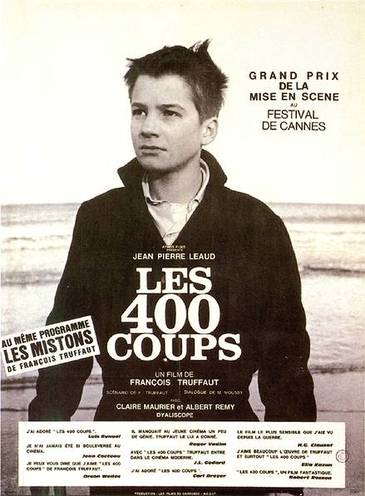
THE 400 BLOWS (LES QUARTRE CENTS COUPS)
France, 1959, 99 minutes, Black and white.
Jean Pierre Leaud, Claire Maurier, Albert Remy.
Directed by Francois Truffaut.
The Four Hundred Blows was a famous film in its time and has achieved the status of a classic. It was one of the earliest films in the so-called French New Wave at the end of the 50s. This new wave of new directors blended realism with symbolism and striking cinema techniques. Truffaut went on to great fame and classic reputation.
In this semi-autobiographical film he introduces the character Antoine Doinel. Antoine lives an unhappy life, a little boy in suburban Paris. He goes to an institution and at the end, in a famous sequence, he runs away and confronts the sea. There is a tenderness as well as great empathy in Truffaut’s presentation of the experiences of this unhappy young boy. Jean Pierre Leaud is the little boy. He was to be used by Truffaut in the several sequence sequels in which Antoine Doinel grows up. The first sequel was a short episode in the omnibus film Love at Twenty (1963). Antoine was an adolescent in Stolen Kisses 1967 and was ready to be married by 1971 in Bed and Board.
Jean Pierre Leaud has been in many French films especially those of Jean Luc Godard. He was also in Last Tango In Paris as the eccentric fiance. He appeared also in Truffaut’s Day for Night. During the 60s Truffaut directed a number of striking films including Jules et Jim, Shoot the Pianist, Farenheit 451. In the 70s he achieved fame again with Day for Night. He has also appeared as an actor in some of his films and also appeared in Close Encounters of
The Third Kind. The Four Hundred Blows can be recommended in itself. It is well worth seeing in connection with its sequels.
1. The meaning of the title? Its tone? The background of the credits and the Eiffel Tower and impact of Paris?
2. What was the total impact of the film? Its freshness and quality? Its humanity, the role of memory, the detail? The film is considered a masterpiece. Do you agree?
3. How much truth and insight were there in the film? In the presentation of people? Of human living?
4. How much emotional involvement did the audience have? Liking Antoine? Disliking his situation? Approving it or not? How much emotional involvement did the director have in the film?
5. The insight of Francois Truffaut in his screenplay and direction? The quality of Jean-Pierre? Leaud as an actor embodying the character? And the use of Paris as the environment of Antoine?
6. How real a boy was Antoine in himself? The presentation of his background, his family, the reason for his parents' marriage, his father's interest and lack of interest in him, his mother and her vanity, her lovers and Antoine seeing this? The quality of their marriage and quarrelling etc? The background of love and affection and bickering and nagging? The importance of sequences at home, setting the tables etc?
7. Why did Antoine enjoy playing truant? A certain freedom and joy, games and being a child? His enjoyment of music? Standing on his head? Compare these sequences with the school sequences and the boy's eye for attitude, their cruelty, informing etc? what effect did all this have on Antoine's growing up?
8. How important was Antoine's friend and the acceptance that he gave him? The importance of his lying about his mother and the slap? The effect of this? The effect of the truancy on his parents? Their dominating him to obey?
9. The focus on studies and the emphasis on preparation for career? Its relevance to Antoine's life? His cheating and copying Balzac for his essay? His interest in life and career?
10. The involvement of his father and the candle? The discussion of this?
11. The importance of the night out for him? The puppets? A symbol of the merry-go-round in which he is against the wall spinning?
12. The motivation for stealing the typewriter? The goal of seeing the sea? Returning the typewriter and getting caught?
13. The impact of the court sequences, as a follow on from school. the police wagon as a cage, tears? The loneliness of the boy?
14. The effect of the reform school on him? His relationship with the boys, the statue, the clapping? The psychologist probing his motivation? How convincing was this?
15. The importance of his mother's visit and its effect?
16. His father's disowning him and the effect of this?
17. How important was the run to the sea, the way that he was filmed, the symbol of the sea and its vast openness? Antoine looking straight into the audience? Audience response to this and its puzzle?
18. What future would Antoine have?
20. How real a picture of adolescence and growing up and basic human drives was this?